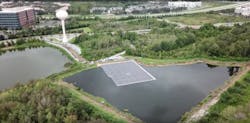Duke Energy to Construct Floating Solar Power Plant in the Southeast
The U.S. Army's Fort Bragg in North Carolina will soon be home to the largest floating solar plant in the Southeast – a 1.1-MW system as part of a Utility Energy Service Contract (UESC) awarded to Duke Energy.
The $36 million contract will focus on energy resilience and security at Fort Bragg: infrastructure modernization including lighting and water upgrades, heating, ventilation and air-conditioning and boiler system improvements.
"As a leader in solar energy, we're excited to bring this unique project to Fort Bragg," said Melisa Johns, vice president, Distributed Energy Solutions at Duke Energy. "This project takes a comprehensive look at the way energy is being used at Fort Bragg and will lead to more efficient energy use and significant cost savings."
Ameresco, Duke Energy's prime contractor, will build the 1.1-MW floating solar PV system on the Big Muddy Lake located at Camp Mackall. Fort Bragg will own and operate the system once construction is completed. Construction is expected to begin in November.
"We approached Duke Energy with the idea of a floating solar array unsure of how they would respond to the innovative concept," said Audrey Oxendine, Fort Bragg Energy and Utilities Branch Chief. "However, Duke Energy was excited to take on the challenge and work with us to make an idea into reality."
The floating solar installation will be paired with a 2-MW battery energy storage system. The system will supplement power to Fort Bragg from the local grid and provide backup power during electric service outages.
Floating solar power could have a big future. The U.S. Department of Energy's National Renewable Energy Laboratory (NREL) researchers estimate that installing floating solar photovoltaics on the more than 24,000 man-made U.S. reservoirs could generate about 10 percent of the nation's annual electricity production. Currently, floating solar makes up only about 1-2 percent of the world's solar capacity.
About 90 percent of the floating solar capacity in the world is in Asia. However, the technology can take advantage of water space that would otherwise go unused – like at Fort Bragg.
North Carolina and Duke Energy are leaders in solar energy. The state is second in the nation for overall solar power capacity. Duke Energy owns and operates 40 solar facilities in North Carolina – one of which is a 13-MW facility at the Marine Corps Base Camp Lejeune in Onslow County.
The project is part of Duke Energy's federal business, which develops and delivers solutions that strengthen infrastructure reliability, operational resilience and energy cost performance. Duke Energy recognizes that federal and military energy infrastructure needs are diverse and uniquely complex.
For more information, download a video of a floating solar facility.
